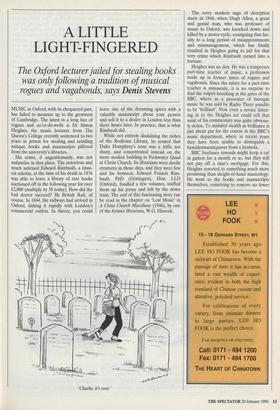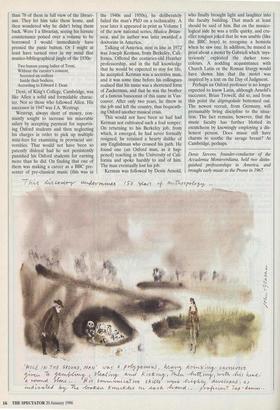A LITTLE
LIGHT-FINGERED
The Oxford lecturer jailed for stealing books was only following a tradition of musical
rogues and vagabonds, says Denis Stevens
MUSIC at Oxford, with its chequered past, has failed to measure up to the greatness of Cambridge. The latest in a long line of rogues and ne'er-do-wells is Dr Simon Heighes, the music lecturer from The Queen's College recently sentenced to two years in prison for stealing and retailing antique books and manuscripts pilfered from the university's libraries.
His crime, if ungentlemanly, was not unfamilar in that place. The notorious and much satirised Edward Rimbault, a musi- cal scholar, at the time of his death in 1876 was able to leave a library of rare books auctioned off in the following year for over £2,000 (multiply by 50 today). How did the bad doctor succeed? By British Rail, of course. In 1844, the railways had arrived in Oxford, linking it rapidly with London's commercial outlets. In theory, you could leave one of the dreaming spires with a valuable manuscript about your person and sell it to a dealer in London less than three hours later. In practice, that is what Rimbault did.
While not entirely disdaining the riches of the Bodleian Library, he sensed that Duke Humphrey's nose was a trifle too sharp, and concentrated instead on the more modest building in Peckwater Quad at Christ Church. Its librarians were docile creatures in those days, and they were few and far between. Edward Francis Rim- bault, PhD (Gottingen), Hon. LLD (Oxford), fondled a few volumes, stuffed them up his jersey and left by the down train. The end of this fascinating story can be read in the chapter on 'Lost Music' in A Christ Church Miscellany (1946), by one of the former librarians, W.G. Hiscock.
`Charlie, it's over.' The sorry modern saga of deception starts in 1946, when Hugh Allen, a great and genial man, who was professor of music in Oxford, was knocked down and killed by a motor-cycle, consigning that fac- ulty to a long period of misappointments and mismanagement, which has finally resulted in Heighes going to jail for that very crime which Rimbault turned into a fortune.
Heighes was no don. He was a temporary part-time teacher of music, a profession made up in former times of rogues and vagabonds. Since the salary for a part-time teacher is minuscule, it is no surprise to find the culprit knocking at the gates of the BBC, where as a presenter of baroque music he was said by Radio Three pundits to be 'brilliant'. Now even a novice listen- ing in to the Heighes act could tell that most of his commentary was quite obvious- ly stolen. To mislabel stealth as brilliance is just about par for the course in the BBC's music department, where in recent years they have been unable to distinguish a hemidemisemiquaver from a hemiola.
BBC freelance rewards might keep a cat in gaiters for a month or so, but they will not pay off a man's mortgage. For this, Heighes resorted to something much more promising than sleight-of-hand musicology. He went to the books and manuscripts themselves, contriving to remove no fewer
than 78 of them in full view of the librari- ans. They let him take them home, and then wondered why he didn't bring them back. Were I a librarian, seeing his hirsute countenance poised over a volume to be borrowed I would immediately have pressed the panic button. Or I might at least have turned over in my mind that musico-bibliographical jingle of the 1930s:
Two buxom young ladies of Trent, Without the curator's consent, Secreted six codices Inside their bodices,
According to Edward J. Dent.
Dent, of King's College, Cambridge, was like Allen a solid and formidable charac- ter. Not so those who followed Allen. His successor in 1947 was J.A. Westrup. Westrup, always short of money, con- stantly sought to increase his miserable salary by accepting payment for supervis- ing Oxford students and then neglecting his charges in order to pick up multiple mini-fees for examining in provincial uni- versities. That would not have been so patently disloyal had he not persistently punished his Oxford students for earning more than he did. On finding that one of them was making a career as a BBC pre- senter of pre-classical music (this was in the 1940s and 1950s), he deliberately failed the man's PhD on a technicality. A year later it appeared in print as Volume I of the new national series, Musica Britan- nica, and its author was later awarded a doctorate in America.
Talking of America, next in line in 1972 was Joseph Kerman, from Berkeley, Cali- fornia. Offered the centuries-old Heather professorship, and in the full knowledge that he would be expected to stay for life, he accepted. Kerman was a secretive man, and it was some time before his colleagues realised that his name was a shortened form of Zuckerman, and that he was the brother of a famous bassoonist of this name in Van- couver. After only two years, he threw in the job and left the country, thus bequeath- ing Oxford another musical crisis. This would not have been so bad had Kerman not cultivated such a foul temper. On returning to his Berkeley job, from which, it emerged, he had never formally resigned, he retained a hearty dislike of any Englishman who crossed his path. He found one (an Oxford man, as it hap- pened) teaching in the University of Cali- fornia and spoke harshly to and of him. The man eventually lost his job. Kerman was followed by Denis Arnold, who finally brought light and laughter into the faculty building. That much at least should be said of him. But on the musico- logical side he was a trifle quirky, and cru- eller tongues joked that he was unable (like the BBC boys) to recognise a hemiola when he saw one. In addition, he mused in print about a motet by Gabrieli which 'mys- teriously' exploited the darker tone- colours. A nodding acquaintance with Church Latin or the Roman liturgy would have shown him that the motet was inspired by a text on the Day of Judgment. Perhaps an Oxford professor is no longer expected to know Latin, although Arnold's successor, Brian Trowell, did so, and from this point the degringolade bottomed out. The newest recruit, from Germany, will presumably bring discipline to the situa- tion. The fact remains, however, that the music faculty has further blotted its escutcheon by knowingly employing a dis- honest person. Does music still have charms to soothe the savage breast? At Cambridge, perhaps.
Denis Stevens, founder-conductor of the Accademia Monteverdiana, held two distin- guished professorships in America, and brought early music to the Proms in 1967.



























































 Previous page
Previous page